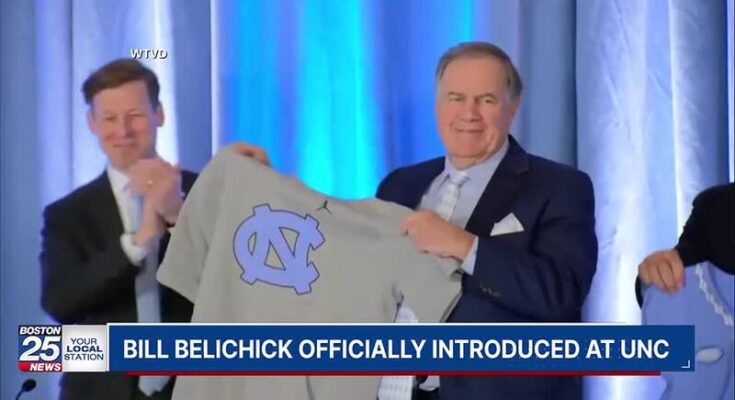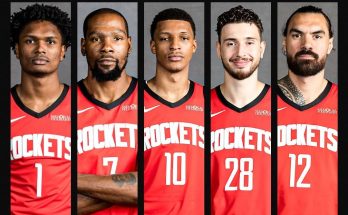In recent years, Notre Dame’s football program—under head coach Marcus Freeman—has repeatedly demonstrated that the college game, even in its evolution toward NFL-style systems, still operates under distinctly different constraints and dynamics. Meanwhile, Bill Belichick, the six-time Super Bowl–winning architect of the “Patriot Way,” has embraced those changes. His decision to take a college job in Chapel Hill, NC, underscores how he sees college football as a “NFL‑lite” platform
But as Notre Dame challenges his assumptions daily—on recruiting, player development, roster churn, and cultural alignment—they cast doubt on the viability of Belichick’s hypothesis. This essay examines these areas in depth and explains how Notre Dame continues to undermine his unexpected college claim.
Belichick contends that college football now mirrors the NFL: NIL revenue equates to player pay, the transfer portal operates like free agency, and roster management resembles professional football structures
He envisions a college program that functions like an NFL franchise—a professional front office, a pipeline to the pros, and a payroll-like model with recruiting and transfers echoing drafting and signings
Notre Dame, with its storied tradition, national reach, and established brand, seemingly meets Belichick’s criteria. Its ability to produce NFL-caliber talent and national relevance aligns with the requirements of an NFL-style operation. Yet, it is exactly in executing under such a premise that challenges emerge—and Notre Dame’s continued success often runs counter to Belichick’s model.
Notre Dame recruits heavily out of states like North Carolina—consistently gaining commitments from legacy recruits, even while Belichick’s own North Carolina program underperforms in this regard . For the 2026 class, ND secured commitments from three 4-star North Carolina recruits, compared to UNC’s two.
Their appeal among sons of NFL legends tells a potent story: plucked legacy stars like the sons of Larry Fitzgerald, Jerome Bettis, and Plaxico Burress have chosen Notre Dame—hardly an overnight NFL-style revelation, but a long-term culture of credibility
Belichick believes top recruits want an NFL pipeline, yet many players choose ND for its tradition, culture, and coaching—including developmental trust under the current staff. The legacy recruits flooding ND point to an appeal grounded in institutional identity rather than how closely a team resembles a pro franchise in operation.
College football now has transfer fees, transfer portal churn, and NIL contracts—echoes of NFL free agency . Belichick assumes this means college coaches can build quickly off portal talent.
But Notre Dame has largely chosen stability over transactional turnover. With fewer splashes in the portal than powerhouses like Colorado under Deion Sanders or UNC under Belichick’s guidance, ND’s roster stability keeps continuity. Their depth often outperforms teams bullish on portal turnover because their players stay, develop, and reinforce systems across years.
ND’s depth charts indicate no overreliance on one-off transfers. Young talent stays competitive, pushes incoming recruits, and fosters leadership retention. This contradicts Belichick’s assumption that frequent personnel replacement—like flipping roster pieces via free agency—is the path to building a college contender.
Belichick’s Rotten discipline style thrives in environments of mature professional athletes. College players, however, are still young adults—with emotional, academic, and developmental needs that require mentorship and cultural coaching.
Reddit analyses confirm: “College kids will buy into being talked down to much more than pros”—but they still need structure, vision, and supportive mentorship
Notre Dame, under Freeman, emphasizes a player-first approach: intentional mentorship, leadership development, and structured support systems. This is far from Belichick’s more top-down, individual-accountability mindset—suggesting NFL coaching methods do not translate directly
Belichick excels at crafting complex tactical wrinkles using high-IQ talent, built for NFL speed. But Notre Dame runs a version of the spread offense and pro-style defenses tailored to underclassmen athletic thresholds—not polished pro athletes. Complex NFL systems risk overwhelming less experienced college players .
The result: ND’s playbook focuses on terminology clarity, manageable adaptation, and incremental learning—all reinforcing their cultural advantage, even as Belichick touts unmatched schematic detail.
Notre Dame prioritizes leadership pipelines that build culture over decades. Continuity in assistants, academic alignment, and alumni network proximity give them a soft power that rookies don’t replicate overnight.
Belichick’s model is a transaction-oriented one—reliable in infrastructure but not necessarily in tradition. ND’s resistance to Belt’s “NFL-lite” front office shows a program still anchored by values beyond professional mimicry.
Belichick expects college NIL collectives and full-time player personnel staff. Notre Dame has those—but uses them as supportive functions, not franchise executives. Their staff isn’t centered on pursuing portal shenanigans or aggressive NIL leverage. They protect the educational balance and cultural identity.
Despite being 2–3 years into the post-Brady era, ND has continued success—including major bowl wins, high AP poll rankings, and national productions—using traditional recruiting, culture-driven development, and stable rosters (
That continuity challenges Belichick’s thesis: ND succeeds not because it’s adopted NFL-style recruitment and transfer strategies—but because it has resisted embracing them in a wholesale way.
Belichick’s UNC experiment shows the opposite pattern. Despite his presence and recruiting brand, early returns are weak compared to Notre Dame, which thrives without the “pipeline” narrative. His own recruiting class lags against ND’s even in Tar Heel country. ND’s continued stream of legacy recruits further highlights belief in culture over structures alone .
Belichick argues his NFL pedigree provides recruiting leverage. His UNC job has landed some recruits—but not enough to offset Notre Dame’s momentum
He suggests college free agency allows rapid roster reshaping—a faster path than NFL rebuilding. Yet, ND’s cautious moves and maintained culture prove another point: stability may outperform procedural churn.
Belichick contends his presence elevates visibility, NIL potential, and donor excitement . However, Notre Dame boasts one of the most visible and donor-supported platforms in college football—already nationally broadcast, heavily media-attended, and deeply financed.
Success in college football arises from leadership, institutional culture, and empathetic adaptation—embedded over time, not transplanted from NFL manuals. Notre Dame’s continued triumphs illustrate the centrality of culture over operational mimicry.
While college football has indeed shifted toward professional models, it hasn’t converged fully. ND demonstrates a hybrid: using some NIL and portal features—but holding onto strategies and values optimized for younger athletes.
Belichick’s move to UNC raises possibilities—yet Notre Dame shows that transfer of NFL-style structure alone doesn’t amount to competitive superiority. Leadership, development, roster strategy, and player culture remain deeper drivers of success.
Bill Belichick’s assumptions—that college football is now an NFL lite, and that an NFL playbook plus roster philosophy guarantees collegiate success—are consistently confronted by Notre Dame’s real-world model. ND disproves these assumptions in tangible ways:
Notre Dame’s model remains rooted in tradition, continuity, and development—blending professional tools with collegiate nuance. It underscores that football’s essence still thrives on culture, identity, and leadership principles that predate and outlast the NFL’s influence.
In short, Notre Dame undermines Belichick’s unexpected NFL claim—not by rejecting modernization, but by embracing modernization on its own terms. Their daily challenge to his paradigm is simple: college football isn’t a scaled-down NFL—it’s a parallel sport requiring its own unique blend of structured discipline and developmental support.
Let me know if you’d like additional sources, modular breakdowns, or sections added!



